
MYCORRHIZA
metrics 2024
Exploring the Roots of Symbiosis
Introduction
MYCORRHIZA is a prestigious journal dedicated to the exploration of mycorrhizal symbiosis and its implications across various biological disciplines. Published by SPRINGER, this journal serves as a crucial platform for researchers and professionals in the fields of ecology, plant science, and molecular biology. With an impressive impact factor reflected in its 2023 quartile rankings—ranking Q1 in both Ecology, Evolution, Behavior and Systematics and Plant Science, as well as Q2 in Genetics and Molecular Biology—MYCORRHIZA plays a significant role in disseminating groundbreaking findings that advance our understanding of plant interactions and ecosystem dynamics. The journal has been active since 1991 and continues to publish cutting-edge research through 2024, ensuring that its audience remains at the forefront of scientific innovation. For additional information about publication protocols and submission guidelines, please refer to the journal's website.
Metrics 2024
 0.92
0.92 3.30
3.30 3.90
3.90 106
106Metrics History
Rank 2024
Scopus
IF (Web Of Science)
JCI (Web Of Science)
Quartile History
Similar Journals
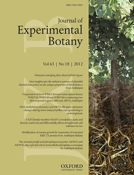
JOURNAL OF EXPERIMENTAL BOTANY
Illuminating the path of plant research innovation.JOURNAL OF EXPERIMENTAL BOTANY, published by Oxford University Press, stands as a premier journal for researchers and professionals in the fields of plant science and physiology. With an illustrious history dating back to 1950, this journal has established itself as a critical resource for advancing our understanding of plant biology and its applications. It is recognized in the top tier of academic publishing, reflected in its Q1 rankings in both Plant Science and Physiology for 2023, and boasts impressive Scopus rankings—placing it in the 96th and 91st percentiles of its respective categories. Though not an open-access journal, it ensures widespread access to groundbreaking research aimed at unraveling the complexities of plant functions and adaptations. As we look toward 2024, the JOURNAL OF EXPERIMENTAL BOTANY continues to play an essential role in fostering innovation, collaboration, and education within this vital area of science.
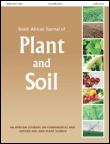
South African Journal of Plant and Soil
Nurturing advancements in ecology and soil management.South African Journal of Plant and Soil is an esteemed academic publication dedicated to advancing the fields of Ecology, Plant Science, and Soil Science. Published by TAYLOR & FRANCIS LTD in the United Kingdom, this journal has been a vital resource since its inception in 1984, providing a platform for innovative research and scholarly articles that address critical issues in plant and soil management. With a current impact factor placing it in the Q3 category according to the 2023 rankings, it occupies an influential position within the academic community, especially amongst researchers focused on agricultural and environmental sciences. Although not an open-access journal, it remains accessible to a broad audience through libraries and institutions that recognize its value in facilitating ecologically and environmentally focused discussions. The journal's ongoing commitment to publishing high-quality research ensures that it plays a pivotal role in nurturing knowledge and fostering advancements in sustainable practices across southern Africa and beyond.

Plants-Basel
Empowering ecological research through open access.Plants-Basel is a distinguished open access journal published by MDPI since 2012, offering a comprehensive platform for researchers and professionals in the field of ecology, plant science, and evolutionary biology. Based in Switzerland, this journal has established itself as a leader in disseminating high-quality research, evident through its impressive rankings in multiple categories, including Q1 in Ecology and Plant Science for 2023. With a substantial impact factor and a dedicated focus on advancing our understanding of plant interactions, ecosystems, and sustainable practices, Plants-Basel is vital for scholars seeking to contribute to these critical fields. The journal's commitment to open access enhances visibility and accessibility, facilitating the widespread sharing of knowledge essential for addressing contemporary ecological challenges.

Botany
Unveiling the mysteries of botanical systems.Botany is a premier academic journal published by Canadian Science Publishing, dedicated to advancing the understanding of plant sciences and ecological systems. With an ISSN of 1916-2790 and an E-ISSN of 1916-2804, this journal has established itself as a respected publication in the fields of Ecology, Evolution, Behavior and Systematics, and Plant Science, reflected in its 2023 Q2 and Q3 rankings. Covering a wide range of topics, Botany is committed to fostering interdisciplinary research, promoting innovative methodologies, and disseminating significant findings from both theoretical and applied perspectives. Based in Ottawa, Canada, the journal is open access, ensuring that high-quality research is accessible to a global audience, thereby playing a crucial role in the dissemination of knowledge in the scientific community. With convergence years from 2008 to 2024, it continues to evolve alongside the scientific advancements in botanical studies, making it an essential resource for researchers, professionals, and students alike.

PHYTON-INTERNATIONAL JOURNAL OF EXPERIMENTAL BOTANY
Exploring the depths of plant biology and its ecological impact.PHYTON-INTERNATIONAL JOURNAL OF EXPERIMENTAL BOTANY is a prominent journal dedicated to the advancement of knowledge in the fields of plant science, biochemistry, and physiology. Published by Tech Science Press in Argentina, this journal serves as a vital resource for researchers, professionals, and students alike. Since its inception in 1984, PHYTON has provided a platform for innovative research and experimental findings, emphasizing the importance of plant biology in understanding ecological and agricultural challenges. With its current quartile rankings indicating a solid impact in its categories—Q3 in Plant Science and Q4 in Biochemistry and Physiology—this journal is strategically positioned to contribute to significant discourse within the scientific community. Access options may vary, providing flexibility to its readership. With a commitment to excellence in research and scholarship, PHYTON remains an essential journal for anyone engaged in the study and exploration of plants and their biological processes.
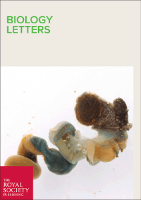
Biology Letters
Fostering impactful research for the future of biology.Biology Letters, published by the esteemed Royal Society, stands at the forefront of research in the field of biological sciences, with a strong emphasis on innovative studies that bridge gaps across disciplines. Since its inception in 2005, the journal has garnered significant recognition, achieving a remarkable Q1 ranking in Agricultural and Biological Sciences (miscellaneous) and a percentile of 88th in the same category, according to Scopus rankings. Released in the United Kingdom, the journal offers a platform for authors to share concise research findings and theoretical perspectives that contribute meaningfully to the advancement of biological inquiry. Although not open access, the journal remains highly regarded in the academic community for its rigorous peer-review process and impactful content, making it an invaluable resource for researchers, professionals, and students dedicated to exploring the complexities of biology. With an ongoing commitment to excellence, Biology Letters continues to shape the future of biological sciences.
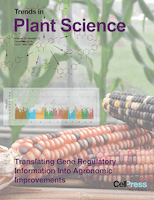
TRENDS IN PLANT SCIENCE
Advancing Plant Science Through Innovative ResearchTRENDS IN PLANT SCIENCE is a premier academic journal published by CELL PRESS, dedicated to advancing the field of plant sciences. With an ISSN of 1360-1385 and E-ISSN 1878-4372, this journal has established itself as a critical resource for researchers and practitioners alike, boasting a remarkable impact factor that places it in the Q1 quartile for plant science in the 2023 rankings. Featuring a comprehensive scope that encompasses emerging trends, innovative research, and pivotal reviews in the plant sciences, it aims to promote interdisciplinary dialogue and encourage progressive research methodologies. Hailing from the United Kingdom, TRENDS IN PLANT SCIENCE serves a global community of over 516 journals, achieving a top-tier ranking of 3rd in the Scopus ranking for Agricultural and Biological Sciences. This makes the journal an indispensable asset for anyone aiming to keep abreast of the latest developments in plant biology and its applications. As we look towards its future converging years from 1996 to 2024, the journal continues to foster scholarly excellence and innovation in the field.

FOLIA GEOBOTANICA
Innovating insights into ecological and evolutionary patterns.FOLIA GEOBOTANICA, published by Springer, is a distinguished journal dedicated to advancing the fields of Paleontology and Plant Science through the dissemination of high-quality research. With an ISSN of 1211-9520 and an E-ISSN of 1874-9348, this journal has been pivotal in providing a platform for innovative studies from 1994 to 2024. Notably, FOLIA GEOBOTANICA holds a Q3 ranking in Paleontology and a Q2 ranking in Plant Science as of 2023, affirming its relevance and contribution to the scholarly community. The journal is located in the Netherlands at VAN GODEWIJCKSTRAAT 30, 3311 GZ DORDRECHT, and is not an Open Access publication, ensuring comprehensive review processes and scholarly integrity. With Scopus rankings that place it in the 50th percentile for Plant Science and 46th for Paleontology, FOLIA GEOBOTANICA continues to attract researchers, professionals, and students who are keen to explore the intricacies of plant ecology and fossil records, thereby fostering a deeper understanding of ecological and evolutionary patterns.
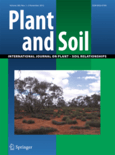
PLANT AND SOIL
Nurturing scientific dialogue for a sustainable future in agriculture.PLANT AND SOIL is a prestigious academic journal that has been at the forefront of plant and soil research since its inception in 1948. Published by SPRINGER in the Netherlands, this journal has carved a niche as a leading source of high-quality, peer-reviewed articles, which are essential for researchers, professionals, and students in the fields of Plant Science and Soil Science. With an impressive impact factor placing it in the Q1 category of both disciplines, it ranks 50th in the field of Plant Science and 24th in Soil Science, highlighting its influence in the scientific community. Although not available as open access, the journal provides a wealth of knowledge and insights into the interactions between plants and soils, exploring critical topics such as soil health, crop productivity, and sustainable agriculture practices. Researchers who wish to contribute to this vital area of study through their empirical findings will find PLANT AND SOIL to be an invaluable platform for disseminating their work and connecting with a network of leading scholars committed to advancing our understanding of these essential ecosystems.

Journal of Fungi is a premier open-access journal published by MDPI, dedicated to advancing the understanding of fungal biology in its myriad forms. Since its inception in 2015, it has become a vital resource in the fields of ecology, evolution, and plant sciences, attaining notable rankings in Scopus, including Q1 status in Ecology, Evolution, Behavior and Systematics, and Plant Science, with a Q2 ranking in Microbiology (medical). The journal fosters a collaborative platform for researchers, professionals, and students by providing unrestricted access to high-quality, peer-reviewed articles, which encourages the dissemination of innovative findings and methodologies relevant to fungal research. Designed to cater to a global audience, the Journal of Fungi has established its significance in the scientific community, especially from its base in Switzerland, where it continues to contribute to the ongoing discourse in mycology and beyond. With its commitment to open access since its launch and its continuous support for groundbreaking research, the journal plays a crucial role in driving forward the scientific inquiry and ecological awareness in fungal studies.